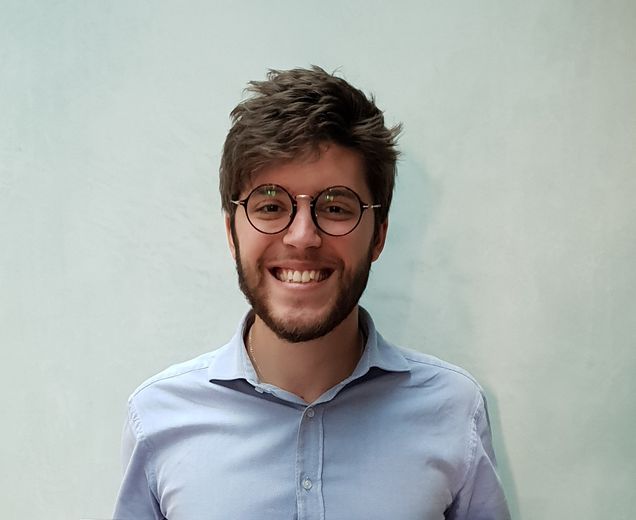Meet Filippo Pavanello, New CISS Visiting Scholar
 Filippo Panavello, a fourth year PhD Candidate in Economics at the University of Bologna, joins the BU Center for Innovation in Social Science as a visiting scholar during Summer 2023. At BU, he is collaborating with CISS affiliate and steering committee member Professor Ian Sue Wing of the Earth & Environment Department (CAS). Filippo is an applied environmental economist whose work focuses on climate change and energy poverty. His research examines the relationship between climate change and households’ adaptation strategies. Applying micro-econometric methods, he is currently studying the impact of climate change on the residential electricity demand. In addition to his new role at BU, he is also a research affiliate at the Euro-Mediterranean Centre on Climate Change and Ca’ Foscari University of Venice. From late 2021 to early 2022 Filippo was a research intern at the Environment Directorate of the Organization for Economic Co-operation and Development (OECD). Here, using Computable General Equilibrium (CGE) models, he worked on the economic costs of net-zero emissions (NZE) transition by 2050. Since 2018, Filippo has been working in collaboration with Prof. Enrica De Cian’s ERC-project ENERGYA. For more information on Filippo’s research and publications, see his website here, and find a Q&A interview with CISS Communications Manager Lily Belisle below.
Filippo Panavello, a fourth year PhD Candidate in Economics at the University of Bologna, joins the BU Center for Innovation in Social Science as a visiting scholar during Summer 2023. At BU, he is collaborating with CISS affiliate and steering committee member Professor Ian Sue Wing of the Earth & Environment Department (CAS). Filippo is an applied environmental economist whose work focuses on climate change and energy poverty. His research examines the relationship between climate change and households’ adaptation strategies. Applying micro-econometric methods, he is currently studying the impact of climate change on the residential electricity demand. In addition to his new role at BU, he is also a research affiliate at the Euro-Mediterranean Centre on Climate Change and Ca’ Foscari University of Venice. From late 2021 to early 2022 Filippo was a research intern at the Environment Directorate of the Organization for Economic Co-operation and Development (OECD). Here, using Computable General Equilibrium (CGE) models, he worked on the economic costs of net-zero emissions (NZE) transition by 2050. Since 2018, Filippo has been working in collaboration with Prof. Enrica De Cian’s ERC-project ENERGYA. For more information on Filippo’s research and publications, see his website here, and find a Q&A interview with CISS Communications Manager Lily Belisle below.
What made you decide to be a social scientist/ why does social science matter to you?
I believe social science provides a powerful tool to shape policy-making, address major global challenges, and promote more equitable societies. By studying social phenomena and analyzing data, I can promote evidence-based policy solutions that may (hopefully) create positive change.
Can you tell us about a current research project that you’re excited about?
I am now concluding an exciting project focused on unequal access to cooling energy in India and the health consequences it entails. The starting point of our research is that extreme heat induces relevant negative effects on human health. Given the projected escalation of extreme heat events due to climate change, these impacts are expected to intensify. We have also observed that households are turning to cooling technologies, particularly air conditioners, as a means to cope with extreme heat. These appliances have been found to be quite effective in reducing thermal distress. However, in developing countries, especially those most affected by global warming like India, the affordability of such technologies remains a significant challenge. Air conditioners are not as widely accessible as in more developed nations like the United States. This is particularly true for India, where there is an urgent need for this technology.
What has led you to the intersection of disciplines within which your expertise lies?
I would say that it has been a mixture of factors. As an environmental economist with a focus on the impacts of climate change, my research has been driven by a combination of academic curiosity, passion for environmental issues, and recognition of the complex challenges posed by climate change. During my MSc in Economics, I became increasingly aware (and curious) of the profound impact that environmental factors have on economic systems and human well-being. This realization sparked my interest in exploring the intersection of economics and the environment, and it became the driving force behind my research interests. As I delved deeper into my studies, I quickly recognized that understanding the economic impacts of global warming first requires a comprehensive understanding that goes beyond economics alone.
How does your research benefit from an interdisciplinary approach?
Integrating knowledge from diverse fields has broadened my perspective and enhanced my ability to analyze the economic impacts of climate change. For instance, by studying the works of epidemiologists I deepened my understanding of whether and how temperature and extreme heat may affect human health.
What do you hope to accomplish during your time at BU?
I hope to improve as an environmental economist, learning from faculty members here at BU. I also hope to extend my professional network, meeting new researchers from all the fields and subjects, and learning from them. And, last but not least, I would like to have fun!